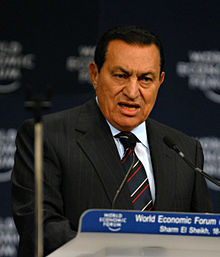Certainly, Egypt has had a rough time since its institution of a presidential system. Mubarak was only the country's 4th president.

Mubarak rose to power in 1981, as he was Vice President to the assassinated Anwar Sadat. He was then elected to the presidency by the autocracy the week later. During his reign, he was friendly with Western governments, supporting a peace treaty with the US and Israel. This popularity with the West kept him as such a strong candidate for the presidency. Though he did oppose the Iraq War, relations with the United States and other western powers in the war remained strong.


However, his domestic regime caused much unrest due to its restrictive nature. He was very unpopular amongst Muslim extremists for his stance against Islamic fundamentalism and his friendliness with Israel, and faced many assassination attempts by these extremists. From another angle, many Egyptians were displeased with the lack of democracy and choice in their government- no one was allowed to run against the President, leading to his long term as leader of Egypt. In 2005, under immense pressure, the Egyptian constitution was amended to allow multiple candidates to run. However, there is little question that the election was rigged and involved threatening voters. Ayman Nour, a fellow candidate, challenged the results and was thrown in jail on 'forgery' charges.

With political corruption and public discontent at a high, the US and many other nations expressed their opposition to Mubarak's presidency. This culminated in February 2011, amidst street protests and President Obama's statement that Mubarak should step down, when Mubarak announced he would not run for re-election. The protesters and public of Egypt rejoiced, though they couldn't have anticipated the equally rocky road ahead.
Mubarak will always be an important part of Egyptian history, particularly in its presidential era. He ruled for an astounding 30 years and both eased relations with the Wets while mucking up a lot of trouble at home.
Sources: BBC News, Wikipedia, biography.com
No comments:
Post a Comment